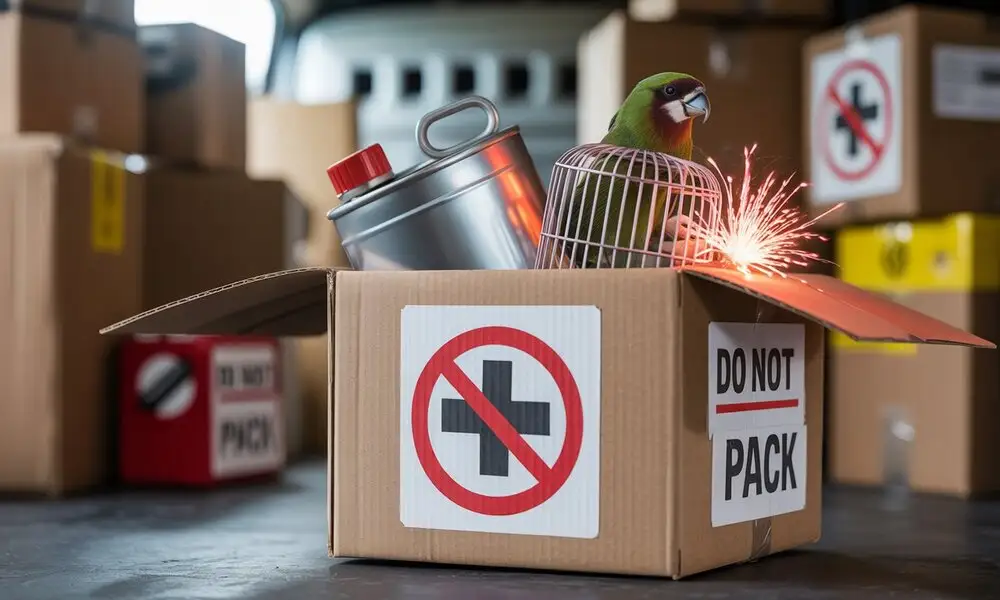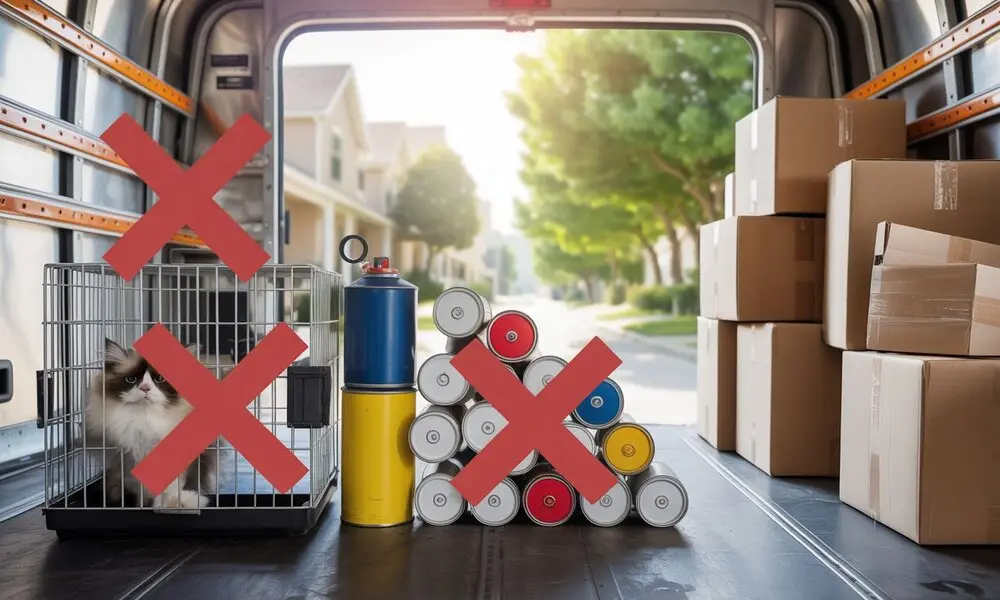What not to pack when moving is just as important to know as what to bring along. Many people focus only on boxing up their belongings but overlook the fact that some items fall under moving prohibited items or restricted moving items. Packing these can create safety risks, cause legal issues, or even damage your other belongings during the move. From hazardous materials to perishables and sensitive documents, being aware of these restrictions helps you avoid unnecessary problems. For a smoother and safer relocation, consider working with a professional moving service that guides you through the process and ensures a stress-free move without the worry of restricted items.
Why It’s Important to Know What Not to Pack When Moving

When planning a move, most people focus on organizing and packing their belongings. But knowing what not to pack when moving is just as critical. Ignoring this step can put your move, your belongings, and even your safety at risk. Let’s look at why avoiding restricted items is so important.
1. Safety Risks
Some items are considered flammable moving items such as gasoline, lighter fluid, paint, or cleaning chemicals. Packing these can lead to dangerous situations inside the moving truck, including fire hazards. Professional movers will never allow these items, and for good reason your safety and theirs depend on it.
2. Legal and Regulatory Restrictions
Moving companies follow strict rules about moving prohibited items. Federal and state regulations prevent movers from carrying hazardous or restricted goods. This means that if you pack these items unknowingly, movers will have to leave them behind, delaying your relocation and adding stress.
3. Protecting Your Valuables
Certain belongings, like important documents, jewelry, or family keepsakes, are better kept with you rather than on the truck. Packing them with your general household goods can increase the risk of loss or damage. Knowing what not to pack when moving helps you protect these valuables and ensures peace of mind throughout the process.
Things Not to Pack When Moving
When preparing for a move, it’s just as important to know what not to pack as it is to know what to take. Professional movers follow strict rules about moving prohibited items, flammable moving items, and other restricted moving items for your safety and theirs. Below, we’ve broken it down into clear categories to help you plan better and avoid last-minute surprises.
Hazardous Materials
Certain items fall under restricted moving items because they pose a risk of fire, leaks, or explosions. Movers are not legally allowed to load these materials onto a moving truck.
Examples include:
- Gasoline or fuel cans
- Propane tanks and lighter fluid
- Paint, paint thinner, and varnish
- Chemicals, pesticides, and cleaning solvents
- Aerosol cans (hairspray, deodorant, spray paint)
Why? These are considered flammable moving items and could cause accidents during transport. The best practice is to use them up before moving or dispose of them safely at a local hazardous waste facility.
Perishable Items
Food and plants may not seem dangerous, but they fall into moving prohibited items because they can spoil, attract pests, or die during the move.
Examples include:
- Fresh produce and frozen foods
- Refrigerated goods
- Open food containers or half-used jars
- Houseplants and potted flowers
The risk? Spoilage, bad odors, and pest infestations inside the moving truck. Instead, try to consume perishables before moving day or donate unopened food to a local food bank. Plants are best transported in your own vehicle.
Valuables and Personal Documents
While not considered restricted moving items, valuables are best kept with you. Movers cannot replace the emotional or financial loss if these items are lost or damaged.
Examples include:
- Jewelry, watches, and cash
- Passports, IDs, and legal documents
- Medical records and prescriptions
- Personal electronics with sensitive data
Best practice: Carry these items in a personal bag or lockbox during relocation. This ensures they remain secure and easily accessible.
Sentimental and Irreplaceable Items
Movers handle belongings with care, but some things are too precious to risk. Family heirlooms and keepsakes don’t technically fall under moving prohibited items, but it’s smart to keep them with you.
Examples include:
- Photo albums and scrapbooks
- Family heirlooms and antiques
- Collectibles or one-of-a-kind artwork
Since movers can’t guarantee the safety of fragile or irreplaceable belongings, it’s better to transport them yourself. This gives peace of mind and keeps memories safe.
Electronics and Special Equipment
Small electronics are often best handled personally rather than packed in the moving truck. While not on the restricted moving items list, they are vulnerable to damage or theft.
Examples include:
- Laptops, tablets, and cameras
- Hard drives and USB devices
- Small music equipment or gaming consoles
Tips for safe transport:
- Pack electronics in their original boxes if available.
- Use bubble wrap and sturdy cases for protection.
- Keep them in your personal vehicle to maintain control and security.
You may read How Do I Start Packing To Move?
What Not to Pack in Moving Truck

When getting ready for a move, not everything belongs in the moving truck. Some things movers are not legally allowed to transport for safety reasons, while others are simply better kept with you for peace of mind. Knowing the difference will save you stress on moving day.
Items Movers Cannot Transport
Certain belongings are considered unsafe to load on a truck because they may cause fire, leaks, or contamination. These include:
- Gasoline, lighter fluid, or fuel cans
- Propane tanks or camp stove canisters
- Paint, varnish, and paint thinner
- Cleaning products or harsh chemicals
- Fireworks or aerosol cans
Items Better Kept With You
Even though movers may agree to take them, some things are too important or fragile to risk. It’s smarter to carry them yourself.
Examples include:
- Jewelry and small valuables
- Medications and prescriptions
- Cash, credit cards, and checkbooks
- Important paperwork (passports, IDs, legal documents, medical records)
- Sentimental belongings such as photo albums, heirlooms, or collectibles
- Electronics like laptops, tablets, and cameras
Checklist: What to Keep Separate on Moving Day
Here’s a simple checklist to help you pack a personal bag or box that stays with you during the move:
- Daily medications
- Wallet, keys, and essential IDs
- Birth certificates, passports, or legal paperwork
- Jewelry and personal valuables
- Laptop, phone, and chargers
- Family photos, heirlooms, or keepsakes
- A small emergency kit (snacks, water, first aid, flashlight)
Why Choose Professional Service for Stress-Free Relocation
Relocating can feel overwhelming, but hiring a professional moving service makes the process smoother, safer, and more efficient. With trained experts handling the heavy lifting, you can focus on settling into your new home instead of stressing about the details.
Benefits of Hiring Professional Movers
1. Safety First
Professional movers are trained to handle bulky furniture, fragile items, and heavy boxes safely. They use proper lifting techniques and protective gear to reduce the risk of accidents or injuries.
2. Efficiency and Time-Saving
Movers work with a system from packing to loading to transport that speeds up the entire process. What might take you days, they can complete in hours.
3. Proper Equipment and Supplies
From moving dollies to padded blankets, movers bring the right tools for the job. This ensures your belongings are well-protected throughout the journey.
4. Guidance on What Not to Pack
A reliable moving company doesn’t just transport your belongings they guide you on what not to pack when moving. They’ll inform you about restricted items (like flammables or perishables) and help you keep valuables and essentials safe with you.
5. Compliance with Regulations
Professional movers follow industry standards and legal guidelines. This ensures your move is compliant with safety regulations and free of unnecessary risks.
Stress Reduction You Can Count On
Moving comes with many decisions, but choosing experts takes the burden off your shoulders. From planning to unpacking, they minimize the chaos and give you peace of mind knowing everything is in capable hands. With our Sherman Oaks packing services, you save time, reduce stress, and gain confidence knowing your move is handled by experts.
Conclusion
Knowing what not to pack when moving helps keep your relocation safe, smooth, and compliant with guidelines. Hazardous, perishable, and sentimental items are best handled separately, while valuables and essentials should stay with you. Always follow mover instructions to avoid risks or delays. Planning ahead makes the process easier and less stressful. Contact us today to book professional movers and packing services in Sherman Oaks for a safe, worry-free move.
FAQs
1. Why Can’t Movers Take Certain Items?
Movers follow safety regulations that prevent them from transporting hazardous, flammable, or perishable goods. These items can cause damage, health risks, or even accidents during the move.
2. What Food Items Should I Avoid Packing?
Fresh produce, frozen foods, refrigerated goods, and open food containers should not go on the moving truck. They can spoil, create odors, and attract pests.
3. Can I Pack Cleaning Supplies For My Move?
It’s best not to. Many cleaning products contain chemicals or liquids that can leak or pose safety risks. Movers usually won’t accept them in the truck.
4. What Should I Do With Jewelry And Important Documents?
Keep valuables and personal documents with you during the move. Items like passports, IDs, jewelry, and medical records are safer in your personal care.
5. Are Plants Allowed In A Moving Truck?
Most movers do not transport plants, especially on long-distance moves. Plants can wilt, attract pests, or spread soil mess during transport.





